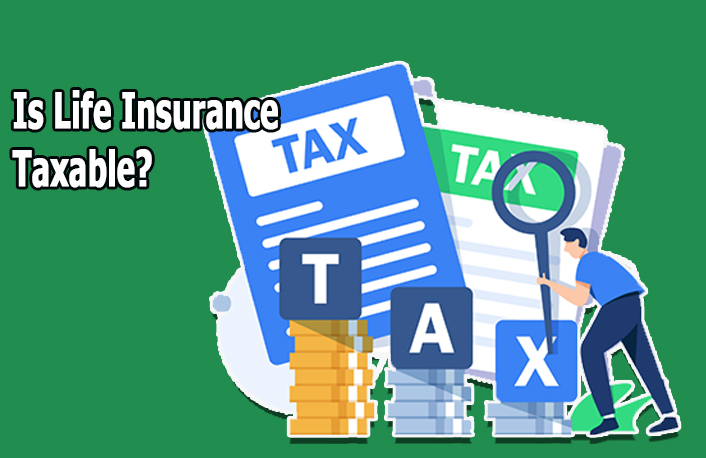The question of whether a life insurance policy’s death benefit payout is taxable is a common concern regarding life insurance. Life insurance is a crucial financial protection for beneficiaries in case of the policyholder’s death. It is imperative to know the given situation where a tax deduction is applicable and when it is not.

Understanding the tax implications of life insurance can ensure that the policy’s beneficiaries receive the full value of the insurance proceeds. Furthermore, this article provides a comprehensive guide to understanding the nuances of life insurance policies you read to the end.
Is Life Insurance Taxable
Life insurance is purchased by an individual who seeks protection against myriad risks for himself and his loved ones. When an untimely death occurs, the life insurance proceeds will be distributed to the beneficiaries named on the policy. If you are wondering whether life insurance is taxable, here’s the good news: it is not. The life insurance benefits are not taxed, and it offers peace of mind because the coverage amount is usually high. So, beneficiaries of a life insurance policy need not bother about the tax implications.
Nevertheless, there are some specific situations where proceeds from life insurance can be taxable. Some of the factors that influence the taxable status of life insurance are premiums, cash value, and death benefits.
How Many People Are Involved In Life Insurance Policy
Typically, three major people are involved in life insurance, and they perform different roles throughout the life of the policy. These sets of people include:
- The Policyholder: This is the person who purchased and owns the policy. For this reason, he/she is responsible for paying the premiums and managing the policy. The policyholder is responsible for managing the policy’s affairs and collaborates with their insurance provider in case of a claim.
- The Insured: This person insured under a life insurance policy typically benefits from the coverage the policy offers. In essence, the person’s life is given all forms of protection by the life insurance policy.
- The Beneficiary: The beneficiary on a life insurance policy can be two or more, and they are referred to as backups for the policyholder. The beneficiary is the next in line to receive the death benefit of the policyholder in the event of death.
Another important figure in life insurance policy is the insurance company that issued the policy. They also take an active part in managing the policy owner’s coverage and future claims. They are responsible for ensuring that the policyholder’s death benefit is distributed to the appropriate person.
Situations Where Life Insurance May Be Taxable
Life insurance death benefits are typically tax-free, but certain circumstances may necessitate paying taxes on certain payouts. Some of these scenarios are highlighted below:
- Policy Ownership Changes: If the life insurance policy was transferred for a valuable consideration (such as being sold or exchanged), the beneficiary may be subject to taxes on a portion of the death benefit that corresponds to the policy’s purchase price. We refer to this as the “transfer-for-value rule.”
- Business-Owned Policies: The death benefit from a life insurance policy owned by a business may be subject to taxation as business income, only if the business is named as the beneficiary.
- Interest on Installment Payments: Should the recipient receive the death benefit in installments as opposed to a single payment, any interest accrued on those installment payments may be subject to taxation.
- Policy Loans or Withdrawals: A policyholder’s withdrawals or loans made against the policy’s cash value can be regarded as taxable distributions.
- Employer-Provided Life Insurance: If an employer offers life insurance, there may be tax ramifications, particularly if the coverage exceeds specific thresholds.
The death benefit awarded to each beneficiary is not included in their taxable income unless specific circumstances are met. To fully comprehend the nuances of your specific life insurance policy and circumstances, you must speak with a tax professional. Making the most of this crucial financial protection’s tax-free status can be achieved through careful preparation.
FAQs
Are life insurance premiums taxable?
Unfortunately, the premiums you pay on your life insurance policy cannot be deducted from your tax income. This means that life insurance premiums are generally not taxable. To get a better idea of how tax and life insurance work, it is advisable to reach out to a tax professional for cogent information.
Is there a penalty for cashing out a life insurance policy?
If you cash out a life insurance policy, you might pay a surrender fee, which is the only penalty for surrendering the cash value of your policy. The surrender fee will be deducted from the payout by your insurance company, and the remaining money will be sent to you.
You can check your policy documents to confirm the fee attached to cashing out your life insurance policy. If you are still unclear about that, reach out to your insurance details for more information, or you could speak to an agent.
Do I pay inheritance on life insurance?
The answer to this question depends on the applicable state inheritance tax laws, beneficiary designation, and policy ownership. Generally, the proceeds from life insurance are paid tax-free to the beneficiaries named on your policy, and so there should be no inheritance tax on a life insurance policy. It makes sense to consult a tax professional for more clarity.

